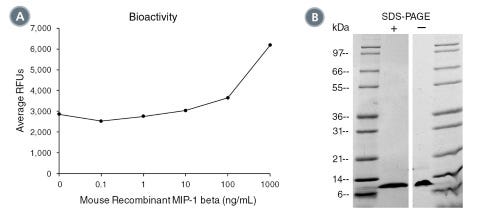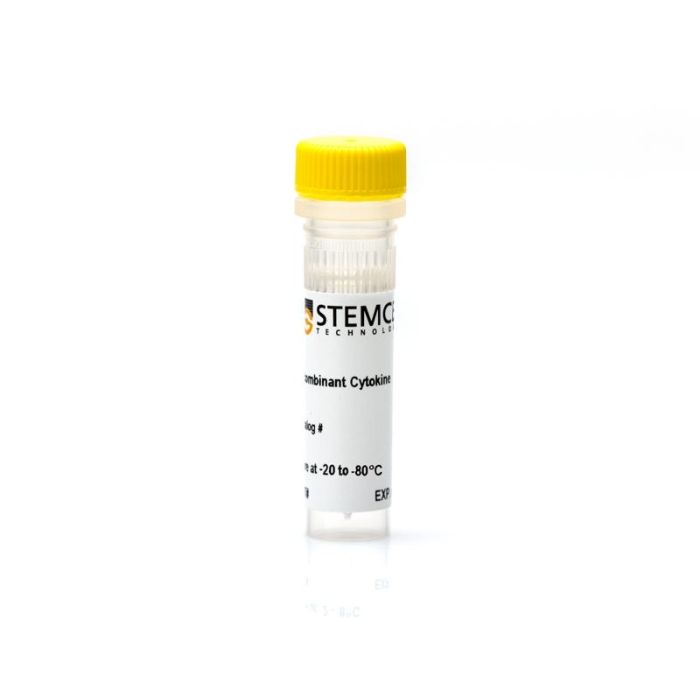产品号 #78091_C
巨噬细胞炎性蛋白-1 β
巨噬细胞炎性蛋白-1 β (MIP-1 β),又称CCL4,是CC趋化因子家族的一员,与CCL3 (MIP-1 α)关系最为密切。MIP-1 β的细胞来源包括活化的白细胞(单核细胞、T细胞和B细胞)、脑内皮细胞和平滑肌细胞(Lukacs et al.; Menten et al.)。MIP-1 β, MIP-1 α和RANTES是主要的HIV抑制因子,可能通过与CCR5受体的相互作用发挥作用。CCR5也是HIV进入CD4+ T细胞的主要受体,这些趋化因子可通过竞争结合 CCR5 来抑制 HIV 感染(Cocchi et al.; Menten et al.)。MIP-1 β吸引多种免疫细胞到病原感染部位。除了趋化功能外,MIP-1 β还能诱导促炎细胞因子的释放、肥大细胞脱颗粒和NK细胞激活(Schall et al.)。在小鼠中,MIP-1 β将调节性T细胞募集到B细胞和抗原呈递细胞中,在T细胞和体液反应的启动中起着关键作用,一旦调节性T细胞或MIP-1 β被耗竭,会导致体液反应的失调和自身抗体的产生(Bystry et al.)。
亚型
细胞因子
细胞类型
B 细胞,树突状细胞(DCs),间充质干/祖细胞,单核细胞,NK 细胞,其它细胞系,T 细胞,T 细胞,CD4+,T 细胞,CD8+
种属
小鼠
研究领域
免疫,干细胞生物学
纯度
≥ 95 %

(A) The biological activity of Mouse Recombinant MIP-1 beta (CCL4) was tested by its ability to induce chemotaxis of THP-1 cells. Cell migration was measured after 45 min using a fluorometric assay method. Increase in migration over basal level was seen starting at 100 ng/mL. (B) 1 μg of Mouse Recombinant MIP-1 beta (CCL4) was resolved with SDS-PAGE under reducing (+) and non-reducing (-) conditions and visualized by Coomassie Blue staining. Mouse Recombinant MIP-1 beta (CCL4) has a predicted molecular mass of 7.8 kDa.
Find supporting information and directions for use in the Product Information Sheet or explore additional protocols below.
This product is designed for use in the following research area(s) as part of the highlighted workflow stage(s). Explore these workflows to learn more about the other products we offer to support each research area.
Thank you for your interest in IntestiCult™ Organoid Growth Medium (Human). Please provide us with your contact information and your local representative will contact you with a customized quote. Where appropriate, they can also assist you with a(n):
Estimated delivery time for your area
Product sample or exclusive offer
In-lab demonstration
| Species | Mouse |
|---|---|
| Purity | ≥ 95% |

免疫磁珠负选不带标记的小鼠CD4+ T细胞
扫描二维码或搜索微信号STEMCELLTech,即可关注我们的微信平台,第一时间接收丰富的技术资源和最新的活动信息。
如您有任何问题,欢迎发消息给STEMCELLTech微信公众平台,或与我们通过电话/邮件联系:400 885 9050 INFO.CN@STEMCELL.COM。

